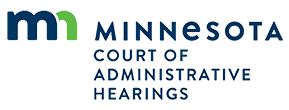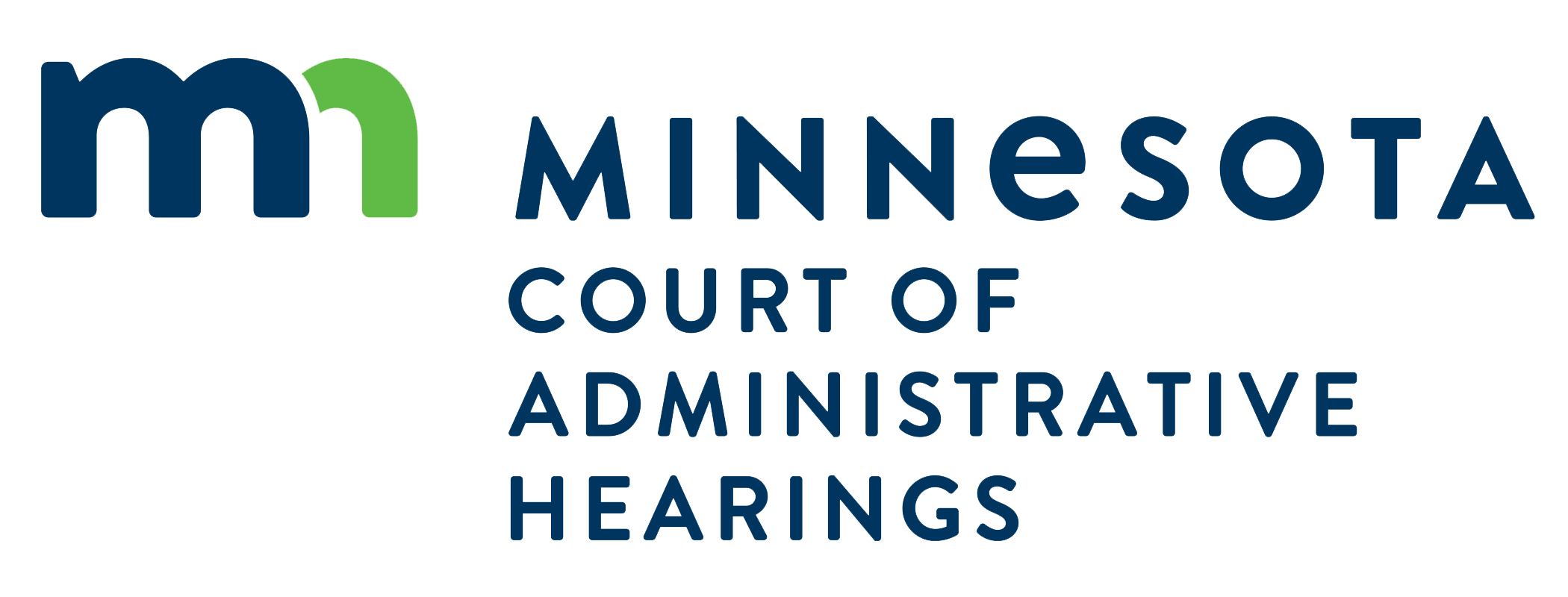Workers' Compensation Guide for Self-Represented Employees
The Court of Administrative Hearings (CAH) conducts settlement conferences, mediations and hearings for disputed workers’ compensation claims. The proceedings are conducted in an impartial and fair manner.
This guide provides information that may be of assistance as you navigate through the workers’ compensation system. It is not meant to be comprehensive nor is it meant to provide you with binding legal advice.
The Minnesota Department of Labor and Industry also publishes a guide to the workers’ compensation process. That agency is a valuable resource for questions you might have about workers’ compensation benefits, or the litigation process. You may contact them at http://www.dli.mn.gov/workers/workers-compensation-workers or by phone at (651) 284-5032.
-
Filing a Claim if a Dispute Arises
Back to topA. Disputes over wage loss benefits or liability for a claim
Employee’s Claim Petition: If your work-related injury is disputed or if wage loss benefits have not been paid, it may be necessary to file a Claim Petition to initiate litigation. If you are in a financial hardship situation, you may file an Affidavit of Significant Financial Hardship. Your affidavit will be presented to a Compensation Judge and, if the Compensation Judge agrees you have a financial hardship, a hearing on your claim will be scheduled on an expedited basis.
Claim Petition for Dependency Benefits or Payment to Estate: If a work-related injury results in death of the employee, it may be necessary to file a Claim Petition for Dependency Benefits or Payment to the Estate to initiate litigation.
Employee's Objection to Discontinuance: If an administrative conference has been held pursuant to Minn. Stat. § 176.239, and if you object to the decision of the Compensation Judge, you may file an Objection to Discontinuance. An Objection to Discontinuance may also be filed if the time to request an administrative conference under Minn. Stat. § 176.239 has expired, but it has been less than 60 days since the insurer filed a Notice of Intention to Discontinue Workers’ Compensation Benefits to stop your wage loss benefits.
B. Disputes over payment of medical bills or approval of medical treatment
Medical Request: If the employer and insurer have accepted liability for your work-related injury and a dispute arises over payment of medical bills or approval of medical treatment, it may be necessary to file a Medical Request to initiate litigation. If you have attended an administrative conference and received an unfavorable decision, you may file a Request for Formal Hearing to initiate additional litigation.
If the employer and insurer have not accepted liability for your work-related injury, then it may be necessary to file a Claim Petition to initiate litigation.
C. Disputes over vocational rehabilitation services
Rehabilitation Request: If the employer and insurer have accepted liability for your work-related injury and a dispute arises over vocational rehabilitation services, it may be necessary to file a Rehabilitation Request to initiate litigation. If you have attended an administrative conference and received an unfavorable decision, you may file a Request for Formal Hearing to initiate additional litigation.
If the employer and insurer have not accepted liability for your work-related injury, then it is necessary to file a Claim Petition to initiate litigation.D. Discontinuance conference requests under Minn. Stat. § 176.239
If the insurer stops your wage loss benefits, you should receive a form called a Notice of Intention to Discontinue Benefits (NOID). The NOID form includes instructions on how to request an administrative conference concerning your benefits. You may request an administrative conference within the timeline given on the form (usually within 12 days after the NOID is received by the state). This is called a “.239 request,” which is a request for an informal administrative conference. It is referred to as a “239 conference” because the procedures are contained in Minnesota Statutes § 176.239. If your wage loss benefits have stopped and you did not receive the NOID form, you may also contact CAH to request a conference.
Submit a request for a .239 Conference via eFiling or by US Mail. If you are a self-represented employee and do not have an attorney, you may also request a .239 Conference by telephone. Call CAH at 651-361-7901 and leave a message with the following information:
- Your name and contact information;
- Your worker identification number (WID);
- Your date of injury;
- The date the Notice of Intention to Discontinue (NOID) was served;
- Which box on the NOID is checked:
- If box 1 or 2 is checked, state the return to work date;
- If box 3 is checked, state the reason;
- If no NOID was filed, the final payment date;
- The names of the employer, insurer, the insurer's attorney, and the QRC, if known;
- If an interpreter is needed, please state the requested language.
-
What Happens After You Have Filed Your Claim
Back to topA. Discovery process
After you initiate your claim against the employer and insurer, an attorney will likely contact you representing their interests. The attorney may serve you with a demand for information. This process, known as "discovery," is essentially a process by which the parties exchange information that is relevant to the claim. If there is a dispute about whether certain information is discoverable, a motion may be filed. The rules governing discovery, motions, and other general litigation procedures are set forth in Minnesota Rules chapters 1415 and 1420.
B. Judge assignmentYour case will be assigned to a Workers' Compensation Judge. After that, correspondence or motions should be directed to the assigned judge. If you need to communicate with the judge for any reason prior to the hearing, you should do so in writing and send a copy of your correspondence to all other parties.
C. Settlement conference
Typically, each case is scheduled for a settlement conference. The purpose of a settlement conference is to discuss resolution of your claim. At least seven days prior to the conference, you should submit a settlement proposal to the insurer’s attorney. It is helpful if you itemize each of your claims, including any outstanding medical bills.
Settlement conferences are scheduled to be held in person. You may make a motion to use an alternative proceeding location (such as video conferencing) on a case-by-case basis.
You are required to file a Pretrial Statement at least five business days prior to the settlement conference. Further instructions about pretrial statements can be found in the Standing Pretrial Order. At the settlement conference, you should be prepared to enter into settlement discussions with the insurer’s attorney. A Workers' Compensation Judge will be present at the conference to facilitate the discussion. The decision to settle your case is yours to make; the Judge will not make that decision for you. If the matter does not settle at the settlement conference, a hearing will be scheduled if one has not already been set.
If you settle your case, a Stipulation for Settlement will be drawn up for your signature, and submitted to a Workers' Compensation Judge for approval.D. Pretrial conference
A Workers' Compensation Judge may set your case for a pretrial conference. Pretrial conferences are typically held by telephone. At the pretrial conference, you should be prepared to discuss your claim with specificity, including the nature of your injury and the benefits you are claiming as a result of your injury. You should itemize your wage loss claim and any outstanding medical bills. In addition, you should inform the Judge what documentary evidence you plan on presenting at the hearing, and identify any witnesses you intend to call.
E. Hearing
Hearings are scheduled in St. Paul at 600 North Robert Street, in Duluth at 11 East Superior Street Suite 180, and throughout the state at hub locations. Once a hearing date is set, CAH notifies all parties in writing of the date, time and place of the hearing. Parties may move the court to use an alternative proceeding location (such as video conferencing) on a case-by-case basis.
If an interpreter is required for the hearing, you must make that request at least 30 days prior to the hearing. If an interpreter is requested, one will be provided at no cost to you. Visit the Court Services page for information on how to request an interpreter.
Hearings are held before a Workers' Compensation Judge. The judge may request an opening statement by each party. Witnesses are sworn in before testifying. You have a right to present your own witnesses and cross-examine witnesses presented by other parties. You may submit documents and reports that you wish the judge to consider as part of your case. Each party may present a closing statement on the claim and defenses. All hearings are recorded digitally or by court reporter. After the hearing, the judge will issue a Findings and Order. This is the decision of the case.F. Settlement and Stipulation Assistance
Pursuant to Minn. R. 1420.2050, a stipulation for settlement must be filed within 45 days of the date the parties reached a settlement agreement. If the stipulation is not timely filed, and good cause for the delay is not shown after notice to the parties, the judge shall reinstate the matter on the active trial calendar, strike or dismiss the matter, or schedule the matter for another proceeding. CAH shall assist the parties in finalizing and filing a stipulation for settlement.
If a case has settled, the parties should notify OAH in one of these three ways:
- eFile written notice using the filing type Other - Notice of Case Settlement;
- Mail written notice to CAH; or
- Email OAH.Settlements-SCCancel@state.mn.us.
If no stipulation has been filed 15 days after CAH receives notice of case settlement, a reminder letter is sent to all parties on the case.
If no stipulation has been filed 30 days after CAH receives notice of case settlement, a formal notice is sent to all parties on the case.
If no stipulation has been filed 18 days after the formal notice is issued, the case is referred to the assigned judge for action. The judge may choose to reinstate the matter on the active trial calendar, strike or dismiss the matter, or schedule the matter for another proceeding.
G. Appeal
Any party has the right to appeal the Findings and Order of the Workers' Compensation Judge. A Notice of Appeal must be filed within 30 days of receipt of the Findings and Order. Specific requirements of the Notice of Appeal, along with instructions on how to serve the Notice of Appeal, can be found in Minn. Stat. § 176.421, subd. 4.
The Workers’ Compensation Court of Appeals (WCCA) will review the hearing record. The WCCA can affirm, reverse, remand, or modify the judge's order. All parties will receive a copy of the WCCA decision. Any party may also appeal the WCCA decision to the Minnesota Supreme Court.
-
Obtaining an Attorney
Back to topAs the employer and insurer will likely have an attorney, it may be in your best interest to obtain your own attorney. However, you are not required to have an attorney at the hearing or at any proceeding at CAH. If you wish to have an attorney represent you, the following resources may be of assistance to you:
- Minnesota State Bar Association: http://www.mnfindalawyer.com/
- Hennepin County Bar Association: 612.752.6666 or http://www.hcba.org/
- Ramsey County Bar Association: 651.224.1775 or http://www.ramseybar.org/

